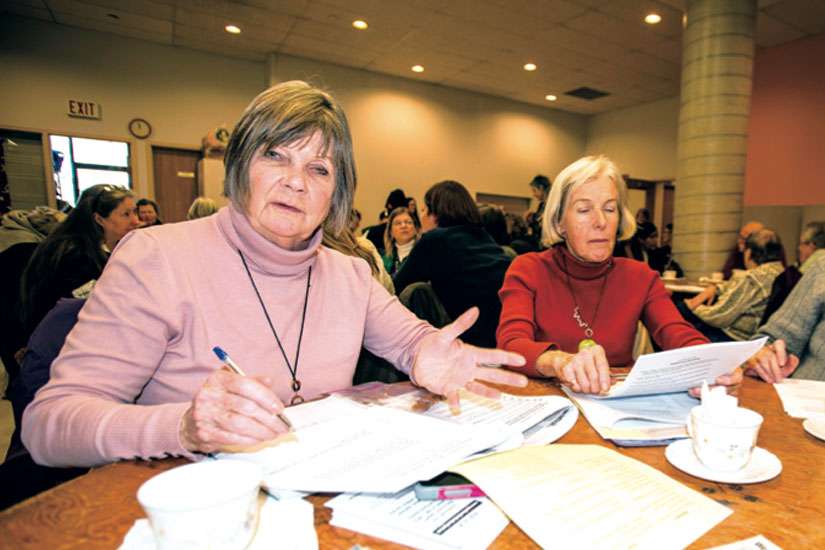“If people at the church think they’re going to end poverty by volunteering at the food bank, they’re not,” said Put Food In The Budget provincial organizer Mike Balkwill. “If they think they’re alleviating poverty, they’re maybe alleviating a very small part of it.”
Volunteers at food banks across Canada manage to collect and distribute 90 million kilograms of food per year. But spread out over the 1.7 million Canadians per year who pick up groceries at a food bank, it works out to just less than five kilograms or $24.50 worth of food per month, according to the latest Put Food In The Budget analysis launched at a Dec. 4 provincial campaign meeting in Toronto.
Parish volunteers is no way to run a social policy, according to Hamilton volunteer Susan Mumma.
“If corporations paid taxes instead of making donations, I think that would be a lot more effective,” said Mumma, who came to Toronto for the annual Put Food In The Budget campaign meeting representing Hamilton Organizing for Poverty Elimination, or HOPE.
“We’ve been asking the Liberal government in Ontario many, many years now to raise the rates, even $100 a month extra, to put food in the budget,” said Tara Kainer who works for the Justice Peace and Integrity of Creation office of the Sisters of Providence in Kingston, Ont. “In terms of the budgets that governments have, that’s not an impossible task.”
The provincial government this year launched its second five-year poverty reduction strategy covering 2014 to 2019. The 2014 budget increased Ontario Works benefits by $30 for a single adult without children, a total increase of $114 million per year by 2016-17.
But another one-per-cent increase in welfare rates is meaningless when Ontario Works for a single person in Ontario comes to $656 per month — far below the poverty line — according to the Put Food In The Budget campaign. The campaign analysis paper points to City of Toronto Public Health research that shows the average monthly cost of a nutritionally adequate food basket is $266.50, or more than 40 per cent of an Ontario Works welfare cheque.
Sr. Una Byrne has seen a steady increase in the number of Kingston families who come to the St. Vincent de Paul Society looking for food.
“The number of people looking for food there has increased exponentially,” Byrne said.
The Sisters of Providence support the Put Food In The Budget campaign because people need something more than a hand-out, she said.
Food banks began 30 years ago as an emergency stop-gap during a severe recession, said Balkwill. Today, governments are being let off the hook by volunteers at food banks doing their job for them. Balkwill also complains the food bank system has created a marketing bonanza for corporations who launch feel-good campaigns to raise relatively paltry amounts of food and money. Twelve major corporate campaigns contribute just three per cent of the food at Canada’s food banks, according to Queen’s University political science researcher Simon Robinson.
Purolator raised 600,000 kilograms of food through it’s Purolator Tackle Hunger campaign in conjunction with the Canadian Football League this year.
The Put Food In The Budget analysis of corporate campaigns doesn’t include the much larger contribution of expired and unpurchased food contributed to food banks by grocery chains and food wholesalers across the country. About a quarter of food bank stocks come from these sources.
Even though the Sisters of Providence back the Put Food In The Budget campaign, that doesn’t mean the sisters want to close the food banks or discourage volunteers, said Byrne. While the religious order wants to see justice in welfare rates and the minimum wage, there will always be a place for charity.
“It’s a two-winged bird sort of thing. We need charity and justice,” she said. “It’s a matter of both... Our efforts in the area of justice want to make sure that people don’t need those handouts. It takes away from the dignity of people to have to go and accept handouts.”
The Catholic Church in Canada should find a way to be more clearly on the side of the poor, said Byrne.
“Where are our bishops? Where are our clergy? They’re just not there. It is disappointing,” she said.
Despite the anti-corporate rhetoric and union backing, Balkwill claims the Put Food In The Budget campaign is not politically aligned.
“I think we’re a very open campaign. I don’t think we’re politically aligned at all. In fact, the NDP has been very disappointing in the positions they’ve taken on poverty. They didn’t do very much in the last campaign at all. So, I think we need and we welcome people from all across the ideology spectrum,” he said. “Regardless of ideology, all people believe you shouldn’t have to go to the food bank.”


